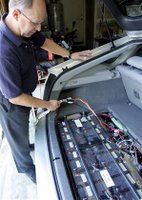Monday, May 22, 2006
End Times for Cheap Oil

James Howard Kunstler, author of "The Long Emergency: Surviving the Converging Catastrophes of the Twenty-First Century," has emerged as the most dire and articulate proponent of a school of thought known as Peak Oil, the idea that the world has or will soon reach maximum oil production, after which oil becomes scarcer and more expensive to extract.
But there's nothing theoretical about it. Like global warming, Peak Oil - a bell-curve description of oil reserves first outlined by geophysicist M. King Hubbert - widely accepted by serious people. Discoveries of new oil topped out in 1964. The world consumes about 27 billion barrels of oil a year. At current pace, the world's estimated 1 trillion barrels of oil reserves will be gone within a few decades, but as a practical matter, extracting every drop from sources like Canadian oil shale would be impossible, since the effort would consume more energy than it produces.
"After peak," writes Kunstler, "all bets are off about civilization's future."
If Al Gore's documentary "An Inconvenient Truth" has a single message, it's that global warming is bad—very, very bad. Floods, droughts, famine, disease . . . a miasma of End Times calamity caused by the burning of fossil fuels.
Even at that, Gore is "a candy-assed optimist," according to Kunstler.
Whereas Gore and other prophets of climate change believe we still have the time and means to avert the worst consequences of anthropogenic global warming—hybrid cars, solar panels!—Kunstler argues with hellish persuasion that we are basically toast. Why? The entire edifice of American civilization—from our mega-scale methods of food production to our great repositories of national wealth, that is, the equity invested in our sprawling suburbs—is propped up, trembling as if balanced on matchsticks, on cheap oil. And there is no substitute for cheap oil.
End Times - Los Angeles Times
Post Carbon Books & End of Suburbia DVD
Thursday, May 11, 2006
CalCar's 100+ MPG Plug-in Prius
 In a 3 minute streaming video, watch how to convert a Toyota Prius so that it can be charged using household electricity ... power that is a whole lot cheaper than the gas a normal Prius uses to generate all of its electric power. Learn how it works, and how much easier it would be for Toyota to make their hybrids work this way in the first place. Enjoy! Oh and Laura's not too bad either. http://on10.net/TheShow/2892 - Watch it...then look at the comments...why not add your comments?!?
In a 3 minute streaming video, watch how to convert a Toyota Prius so that it can be charged using household electricity ... power that is a whole lot cheaper than the gas a normal Prius uses to generate all of its electric power. Learn how it works, and how much easier it would be for Toyota to make their hybrids work this way in the first place. Enjoy! Oh and Laura's not too bad either. http://on10.net/TheShow/2892 - Watch it...then look at the comments...why not add your comments?!?North America's 'Car of the Year' has been souped up --or more accurately, "green-tuned" by adding extra batteries and grid-charging, and that's how you get the PRIUS+, --a "gas-optional" or "plug-in" hybrid (PHEV). That means no gas when you do your errands on local streets at 35mph. On the highway, it runs just like any other Prius, with the gasoline engine doing most of the work -- and the extra batteries kicking in to improve performance at ALL speeds. More details at: Village Energy - "The choice of vehicle that you drive has a greater effect on the environment than any other choice you make as a consumer" - Union of Concerned Scientists. Find out more about Plug-in hybrid systems and 'Gas Optional' Vehicles
"Californians For Clean Energy" Seek Part of Oil Profits - Renewable Energy Access
Tuesday, May 02, 2006
Save the Internet: May, 2006
Companies like AT&T want the power to decide which Web sites open properly on your computer, based on which sites pay them the most. This will distort the entire Internet.
Next week (May 8, 2006), Congress votes on the fate of the free and open Internet. Can you sign our petition to save the Internet?
Click Here SIGNS OF THE TIME: May, 2006

Next week (May 8, 2006), Congress votes on the fate of the free and open Internet. Can you sign our petition to save the Internet?
Click Here SIGNS OF THE TIME: May, 2006



